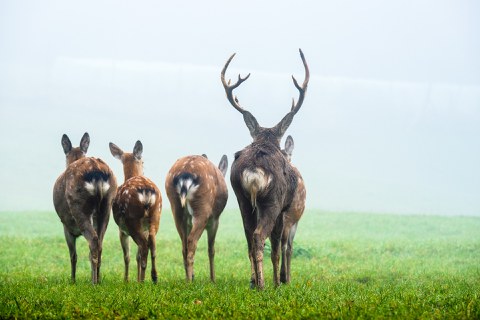Dec 03, 2021
Male animals are subject to stronger evolutionary pressures than females
In the animal kingdom, males are subject to greater selection pressures than females. This is the result of a recent study by scientists at the Technische Universität Dresden, the CNRS in Montpellier, France, and Karlstad University, Sweden. The results suggest that evolutionary adaptation processes are accelerated by sexual selection, a promising finding, for example, with regard to animal species threatened by the climate crisis. The results were recently published in the open-access journal 'eLife'.
In evolutionary biology, there has long been an assumption that sexual selection has not only produced astonishing phenotypic differences between the sexes in many animal species, but also influences the demographic structure of a population as well as its adaptation to environmental changes. Lennart Winkler from Technische Universität Dresden, together with his colleagues from Sweden and France, has now provided empirical evidence for this assumption by evaluating data from 55 studies on different animal species.
Sexual selection is selection arising from competition for mating partners and/or their reproductive cells (their eggs or sperm). For almost a century, researchers have thought that sexual selection is the ultimate selective force that generates the differences we see between male and female animals in terms of reproductive fitness and life history. Yet, little is known about how sexual selection combines with other environmental pressures to impact population demography and adaptive ability.
The DNA of all living organisms develops random mutations – some of which help them become fitter for survival, and some of which provide no benefit and may even cause a disadvantage (so-called deleterious mutations). Evolutionary biologists hypothesize that sexual selection could promote evolutionary adaptation if it gives rise to stronger net selection against deleterious mutations. For example, males carrying a deleterious mutation might have disadvantages in finding mating partners, and so this mutation would not be passed on to the next generation.
The results of the current study show that overall selection typically affects males more than females. "This could accelerate evolutionary adaptations because usually the productivity of a population depends primarily on the fertility of females rather than males. Therefore, stronger selection on males would remove deleterious alleles from the gene pool without having negative demographic effects. Our results therefore support the idea that sexual selection could play a central role in 'evolutionary rescue', which could be crucial, for example, for the adaptation of endangered species to the current climate crisis," explains first author Lennart Winkler from Technische Universität Dresden.
Originalpublikation:
Lennart Winkler, Maria Moiron, Edward H Morrow, Tim Janicke. Stronger net selection on males across animals. eLife 2021;10:e68316. DOI: 10.7554/eLife.68316
Media inquiries:
Lennart Winkler
Faculty of Biology
Applied Zoology

